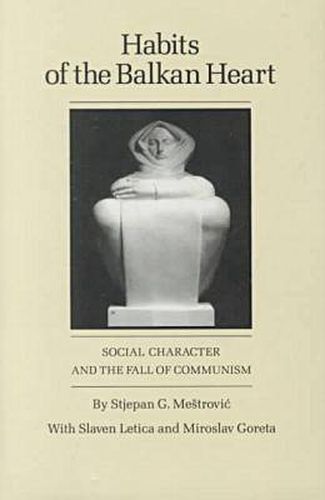Readings Newsletter
Become a Readings Member to make your shopping experience even easier.
Sign in or sign up for free!
You’re not far away from qualifying for FREE standard shipping within Australia
You’ve qualified for FREE standard shipping within Australia
The cart is loading…






Almost as soon as Communism fell in Eastern Europe in 1989, Western politicians and intellectuals concluded that the West had won the Cold War and that liberal democracy had triumphed over authoritarianism in the world. Euphoria spread with the expectation of a New World Order. Within months, the giddy optimism began to fade, especially in the face of what soon became a brutal war in former Yugoslavia. Why did Serbia choose to replicate many of Germany’s methods and aims from World Wars I and II, including ethnic cleansing (read genocide ) and a campaign to establish a Greater Serbia?
Sociologist Stjepan Mestrovi, writing with Slaven Letica and Miroslav Goreta, argues that the social and political character of the Dinaric herdsmen–which dominates Serbian culture and politics, even though it is found in all Balkan nations–accounts for the form Communism took there, the fall of Communism, and the savagery and brutality of the post-Communist war.
With carefully reasoned analysis, the authors show how sociological theories of social character–propounded by such thinkers as de Tocqueville, Veblen, and Bellah–can shed light on the conflicts in the Balkans, which, according to conventional wisdom, were not supposed to occur when Communism fell. They demonstrate that ancient, traditional ethnic, social, and nationalistic tendencies– habits of the heart –of the various people of the Balkans have taken precedence over pressures for democracy in the political and cultural vacuum left by the end of Communism in the region.
Unfortunately, the difficulties in the Balkans will persist for a long time to come, and similar conflicts could break out in the former Soviet Union. This thought-provoking book has much new to say about the causes of such ethnic and class conflicts in the region, and the feasibility of policies for dealing with these sores. If democracy is to be achieved in post-Communist East Europe, the authors argue, it must be based on the good habits of the heart that coexist there with bad or authoritarian social character.
$9.00 standard shipping within Australia
FREE standard shipping within Australia for orders over $100.00
Express & International shipping calculated at checkout
Almost as soon as Communism fell in Eastern Europe in 1989, Western politicians and intellectuals concluded that the West had won the Cold War and that liberal democracy had triumphed over authoritarianism in the world. Euphoria spread with the expectation of a New World Order. Within months, the giddy optimism began to fade, especially in the face of what soon became a brutal war in former Yugoslavia. Why did Serbia choose to replicate many of Germany’s methods and aims from World Wars I and II, including ethnic cleansing (read genocide ) and a campaign to establish a Greater Serbia?
Sociologist Stjepan Mestrovi, writing with Slaven Letica and Miroslav Goreta, argues that the social and political character of the Dinaric herdsmen–which dominates Serbian culture and politics, even though it is found in all Balkan nations–accounts for the form Communism took there, the fall of Communism, and the savagery and brutality of the post-Communist war.
With carefully reasoned analysis, the authors show how sociological theories of social character–propounded by such thinkers as de Tocqueville, Veblen, and Bellah–can shed light on the conflicts in the Balkans, which, according to conventional wisdom, were not supposed to occur when Communism fell. They demonstrate that ancient, traditional ethnic, social, and nationalistic tendencies– habits of the heart –of the various people of the Balkans have taken precedence over pressures for democracy in the political and cultural vacuum left by the end of Communism in the region.
Unfortunately, the difficulties in the Balkans will persist for a long time to come, and similar conflicts could break out in the former Soviet Union. This thought-provoking book has much new to say about the causes of such ethnic and class conflicts in the region, and the feasibility of policies for dealing with these sores. If democracy is to be achieved in post-Communist East Europe, the authors argue, it must be based on the good habits of the heart that coexist there with bad or authoritarian social character.